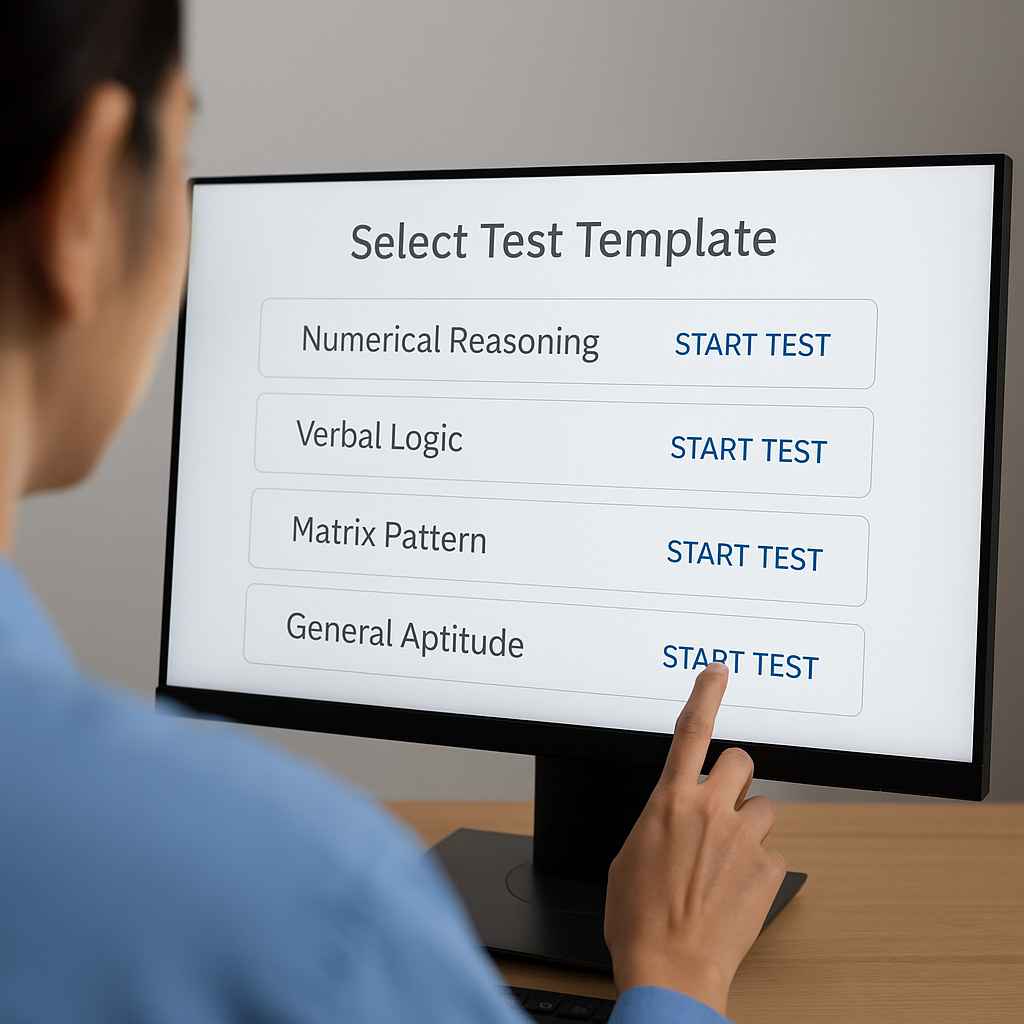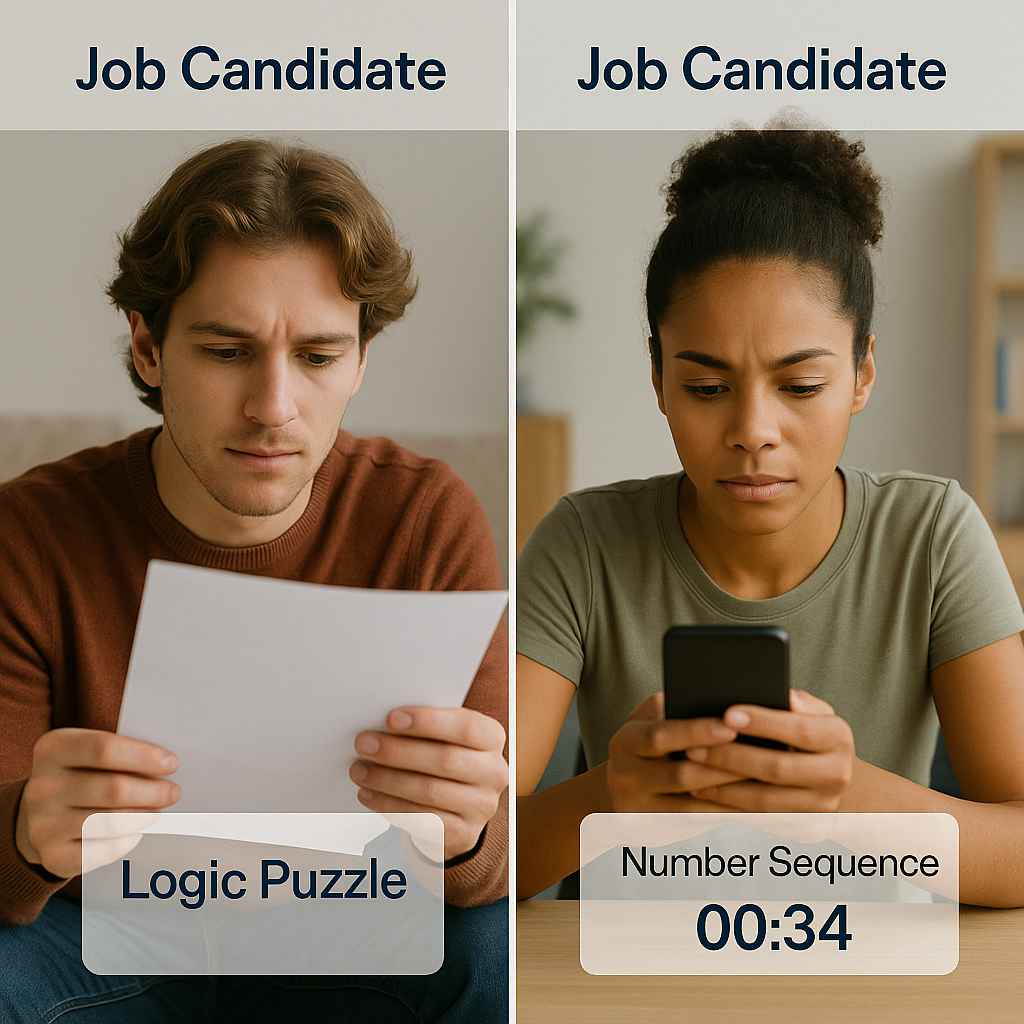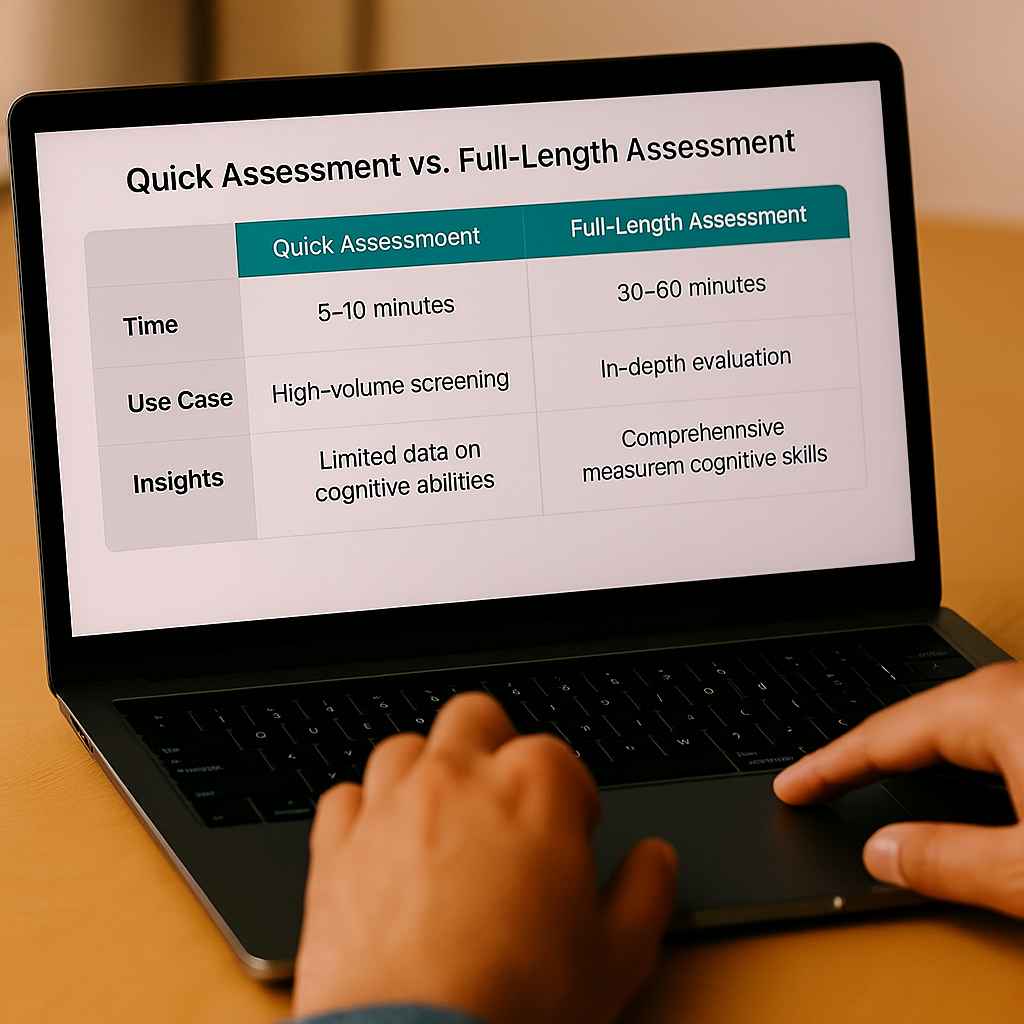Content
Let’s be honest—hiring is messy. You’re juggling deadlines, resumes, interviews, and sometimes making decisions under pressure. But what if you could filter top candidates faster, more fairly, and with fewer regrets?
That’s where quick cognitive assessments come in.
These short tests help you instantly gauge how a candidate thinks, without scheduling a long interview or guessing based on a resume. Whether you’re hiring at scale or just need to move quickly, quick cognitive assessments give you reliable insights into mental agility, logic, and problem-solving skills.
Let’s explore what they are, when to use them, how they work, and why they’re a game-changer for modern hiring teams.
What Are Quick Cognitive Assessments?
Quick cognitive assessments are short, timed tests (usually 5 to 15 minutes) designed to evaluate a candidate’s thinking skills—like reasoning, memory, attention to detail, and processing speed.
They’re essentially a condensed version of full-length cognitive ability tests. While they don’t go as deep, they’re fast, predictive, and easy to administer—perfect for high-volume screening or early-stage evaluations.
If you’re unfamiliar with the broader concept of cognitive testing, check out the full Cognitive Ability Tests for Employment: A Complete Guide to understand the science behind it.
Why Use Quick Cognitive Tests in Hiring?

When you’re trying to fill roles quickly, time is your biggest bottleneck. Quick cognitive assessments offer a solution that’s scalable, fair, and backed by data.
Here’s what they bring to the table:
| Hiring Challenge | How Quick Cognitive Assessments Help |
| Too many applicants, not enough time | Instantly filter top candidates |
| Limited bandwidth for interviews | Identify your thinking ability before you book a call |
| Risk of bias in early screening | Use an objective, standardized evaluation |
| Tight deadlines for short-term hires | Make confident decisions faster |
Want to see how the actual questions work? Our article on Cognitive Assessment Examples: Real Questions & Use Cases walks through common formats and scenarios.
When to Use Quick Cognitive Assessments
These tests are ideal for certain stages and situations in your hiring process. Here’s a practical breakdown:
| Hiring Scenario | Why It Works |
| High-volume applications | Save time by instantly spotting top performers |
| Entry-level and internship roles | Focus on raw thinking potential, not resumes |
| Screening remote or freelance hires | Reduce back-and-forth with a quick, objective test |
| Internal promotions or team reshuffles | Benchmark cognitive agility before role shifts |
You’ll find them especially useful if you’re doing pre-employment testing for large hiring campaigns, or if you’re hiring in industries where learning speed matters more than experience.
What Skills Do These Tests Measure?

Even in a short test format, you’re still evaluating powerful indicators of job success. Most quick cognitive assessments test for:
- Logical reasoning
- Verbal comprehension
- Basic numerical ability
- Pattern recognition
- Problem-solving under pressure
You can even tailor the content based on the job. For instance, a marketing role may focus more on verbal logic, while a finance role may lean into numerical reasoning.
In fact, research supports the effectiveness of short-format cognitive screens in identifying early signs of cognitive ability. One study on quick screening tests highlights how even brief cognitive evaluations can yield meaningful insights, especially when time is limited and accuracy is essential.
👉 Explore our professionally designed test categories:
These are built for speed and accuracy, with real-world logic, not just academic brain teasers.
How Quick Assessments Fit Into the Hiring Process
You don’t need to overhaul your workflow. These tests slide in seamlessly and can be easily integrated into your existing workflow management system if you’re using one.:
🔁 A Typical Workflow Might Look Like:
- Receive application/resume
- Send quick cognitive assessment link
- Review automated results
- Advance top scorers to interviews
- Make data-backed hiring decisions
For even more strategic insights, check out resources like Top Cognitive Assessment Tools for Hiring Success or Understanding Cognitive Assessment Scores, which explain how to choose the right platform and interpret test results.
Pros & Cons: Quick vs. Full-Length Assessments

| Factor | Quick Assessments | Full-Length Assessments |
| Time to complete | 5–15 minutes | 30–45 minutes |
| Ideal for | Early-stage screening | Deep role-fit evaluation |
| Insights provided | High-level mental agility | Detailed breakdown of cognitive strengths |
| Candidate experience | Fast, mobile-friendly | Slightly more demanding |
| Best use case | High-volume roles, entry-level hires | Senior roles, leadership, promotions |
If you’re debating which test to choose, also explore Short Cognitive Assessments: Efficient Tools for Fast Screening for more use cases.
Related Pages
- What Is Cognitive Assessment? Meaning, Uses, and Examples
- Pre-Employment Cognitive Assessments: What Recruiters Need to Know
- Cognitive Behavioral Assessment: What It Is & How It’s Used
- How Much Do Cognitive Assessments Cost? A Practical Overview
- Top Cognitive Assessment Interview Questions to Ask Candidates
FAQ
How long is a quick cognitive assessment?
Most take 5 to 15 minutes, depending on the test type and difficulty. They’re designed to be fast without sacrificing validity.
Are these tests mobile-friendly?
Yes—many quick assessments are built for mobile or tablet devices so candidates can complete them on the go.
Can they really replace longer assessments?
They don’t replace full assessments, but they’re perfect for early filtering. Use full assessments for finalists or complex roles.
What kind of questions do they include?
Typically, logic puzzles, number patterns, short word problems, or simple reading comprehension tasks. They’re short—but revealing.
Final Thoughts
Quick cognitive assessments are small tools with a big impact. They help you screen smarter, move faster, and reduce guesswork—especially in high-volume or time-sensitive hiring scenarios.
And here’s the best part: candidates often prefer them too. They’re short, focused, and offer a fair shot at showing their potential.
So if you’re tired of sifting through resumes or wasting time on interviews that go nowhere, try using a quick cognitive test instead.
👉 Book a free demo and see how our tests help you hire better, faster, and more confidently.
